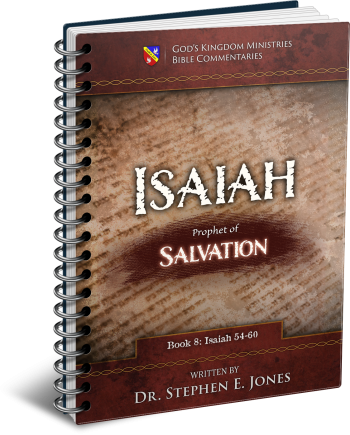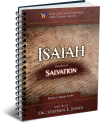Latest Posts
View the latest posts in an easy-to-read list format, with filtering options.

Isaiah is the prophet of Salvation. He is also known as the truly "Universalist" prophet, by which is meant that He makes it clear that salvation is extended equally to all nations and not just to Israel. He lived to see the fall of Israel and the deportation of the Israelites to Assyria, and he prophesied of their "return" to God (through repentance). He is truly a "major prophet" whose prophecies greatly influenced the Apostle Paul in the New Testament.
Category - Bible Commentaries

Having prophesied of the death of Christ in Isaiah 53, followed by the redemption of Christ’s widow in Isaiah 54, the prophet then turns his attention to the New Covenant, represented by Sarah and which is the basis of the Kingdom of God.
Isaiah 55:1, 2 begins with the call of the Spirit,
1 “Ho! Everyone who thirsts, come to the waters, and you who have no money come, buy and eat. Come, buy wine and milk without money and without cost. 2 Why do you spend money for what is not bread, and your wages for what does not satisfy? Listen carefully to Me, and eat what is good, and delight yourself in abundance.”
If Isaiah 53 prophesies about Christ’s death at Passover, Isaiah 55 prophesies about the Holy Spirit that was given as the second part of the promise of God. It was fulfilled partially on the day of Pentecost in Acts 2 and will be fulfilled in a greater way to prepare the way for Christ’s second coming and beyond.
“Ho!” is from owy, or o’ee that is variously rendered “Oh,” “Woe,” “Alas,” etc. It is an interjection used also in Isaiah 3:9, “Woe to them” and in Isaiah 6:5, where the prophet says, “Woe is me, for I am ruined.” It can be a call of distress or just a call to gain one’s attention. In Isaiah 55:1 it is the call of the Spirit to come to God’s feast.
The Spirit thus invites anyone who thirsts after righteousness to come to the only Source of living water that sustains life itself, the joy of new wine, and the nourishing milk of the word. So Jesus said in Matt. 5:6,
6 Blessed are those who hunger and thirst for righteousness; for they shall be satisfied.
Again, in John 4:10 we read of Jesus’ conversation with the woman of Samaria,
10 Jesus answered and said to her, “If you knew the gift of God, and who is it who says to you, ‘Give Me a drink,’ you would have asked Him, and He would have given you living water.”
Jesus had asked her for a free drink of water from the well of Jacob; He would have given her free living water springing up from her core in a never-ending stream. This was certainly a Pentecostal experience in Acts 2, but in the Gospel of John, the prophecy came in the context of the feast of Tabernacles. Jesus said in John 7:37-39,
37 Now on the last day, the great day of the feast [of Tabernacles, John 7:2], Jesus stood and cried out, saying, “If anyone is thirsty, let him come to Me and drink. 38 He who believes in Me, as the Scripture said [in Isaiah 12:2, 3], “From his innermost being will flow rivers of living water’.” 39 But this He spoke of the Spirit, whom those who believed in Him were to receive, for the Spirit was not yet given, because Jesus was not yet glorified.
First, Jesus shouted out the prophecy in Isaiah 55:1, saying, “If anyone is thirsty, let him come to Me and drink.” He then linked this to Isaiah 12:3, which says,
3 Therefore you will joyously draw water from the springs [or wells] of salvation [Yeshua].
Hence, the call of the Spirit through Isaiah the prophet was fulfilled in Yeshua’s call to believe in Him as the Source or Well of living water. Those who heed that call, those who are thirsty, having felt the drawing of the Spirit, are given this living water freely. Being poor is no reason to turn away. Those who have no money are invited to come and, paradoxically, to buy at no cost.
The price of this living water was paid at the cross, as prophesied in Isaiah 53.
The “milk” that the Spirit offers is the nourishment of the word. The Hebrew word for milk is khalav, which comes from a root word that means “fatness.” We know it as butterfat. Heb. 5:12-14 recognizes milk as the basic principles of the word of God that we must all learn when we first believe in Christ. But the author also makes the distinction between milk and meat. Milk is for immature believers; meat is for mature believers.
In Exodus 3:8 Moses spoke about the Promised Land, calling it “a land flowing with milk and honey.” In other words, the promise of God was to be fulfilled in His people by sustaining them with an understanding of the word of God. Honey is linked to this, because it enlightens the eyes. So when Jonathan ate honey in the midst of battle, “his eyes were enlightened” (1 Sam. 14:27, KJV). Milk is the word, but honey is revelation of the word. The two should go together.
The Spirit calls people to purchase both milk and wine, thereby prophesying of the new wine in the New Covenant. Wine speaks prophetically of joy and rejoicing. It was specifically associated with the feast of Tabernacles, where a drink offering of new wine was poured out for seven days. The feast of Tabernacles was celebrated as a time of rejoicing (Lev. 23:40).
Eccl. 9:7 says, “eat your bread in happiness and drink your wine with a cheerful heart.” In the New Testament, the Spirit is often compared to wine, as we see in Eph. 5:18,
18 And do not get drunk with wine, for that is dissipation, but be filled with the Spirit.
While there are other metaphors for the Spirit, such as water and wind, each having its own connotation, the wine metaphor speaks of the joy that comes from the infilling of the Spirit. So Jesus said in John 10:10, “I came that they may have life [living water] and have it abundantly [new wine].”
Again, Jesus said to His disciples in John 15:11,
11 These things I have spoken to you so that My joy may be in you, and that your joy may be full.
If the infilling of the Spirit does not bring joy, then the believer lacks the wine of the Spirit, for Paul says in 1 Thess. 5:16, “Rejoice always.” The Christian life was meant to be a life of rejoicing, regardless of outward circumstances. The joy springs up from one’s core like a fountain of water, even when the land experiences drought.
The Spirit chides those who ignorantly continue on with life, buying food and drink to sustain their natural lives—all of which cost them dearly. Most of the people lived hand to mouth, as it were, barely able to work hard enough to sustain their families. It seems that throughout history, only a few were thirsty for living water. Yet the day will come—and is nearly upon us now—when the Spirit will be poured out upon “all mankind” (Joel 2:28), transforming them from within and bringing heaven to earth.
Isaiah 55:3, 4 continues,
3 “Incline your ear and come to Me. Listen, that you may live; and I will make an everlasting covenant with you, according to the faithful mercies shown to David. 4 Behold, I have made him a witness to the peoples, a leader and commander for the peoples.”
The Old Covenant was temporary, ending in disaster, but the New Covenant is “an everlasting covenant.” The Hebrew word is olam, which means “hidden, unknown, obscure.” The word suggests an unknown time frame, which may mean either a finite or infinite period of time.
In Exodus 40:15 the sons of Aaron were anointed under the Old Covenant “for a perpetual priesthood,” described as olam. Yet that priesthood ended with the Melchizedek Order when the New Covenant was established (Heb. 7:23, 24). Likewise, the priesthood of Phinehas was established in Num. 25:13 by “a covenant of a perpetual priesthood,” where again the descriptive term is olam. His line of priests ended with Eli about 300 years later.
The covenant with David, however, was to endure forever, because it was rooted in the New Covenant through Jesus Christ, the Son of David, who was also the Mediator of that New Covenant. David himself knew this, for he testified in 2 Sam. 23:5, “Truly is not my house so with God? For He has made me an everlasting covenant, ordered in all things and secured.”
This covenant was again described as olam, but it was defined later in Psalm 89:28, 29,
28 My lovingkindness I will keep for him forever, and My covenant shall be confirmed to him. 29 So I will establish his descendants forever and his throne as the days of heaven.
We see that the length of time in this olam was to be “as the days of heaven,” for this was to be the throne of Christ Himself, who lives forever under a never-ending covenant.
This is the covenant that Isaiah sets forth in telling the people about the covenant that He will make with them. It was not the Old Covenant as seen in Exodus 19:8, but the New Covenant that is seen with Noah, Abraham, and David.
In this case, it is not David himself who will rule the earth, but the Son of David—Jesus Christ. All things have been put under the feet (authority) of Christ, as we read in Psalm 8:6, which is quoted in 1 Cor. 15:27 and Heb. 2:8.